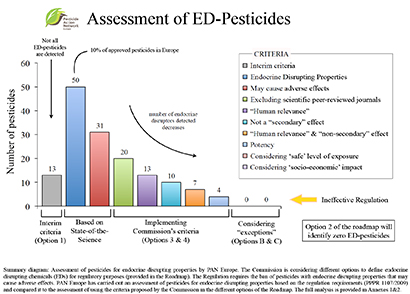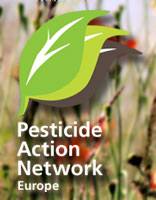20th Januari 2015
Brussels
New non-commercial research proves that industry’s claims on pesticide bans are flawed
For the first time an in-depth research by a non-commercial group shows the exact numbers of endocrine disrupting pesticides (ED-pesticides) that will be regulated if the options of Commission roadmap for an impact assessment of the endocrine criteria [1] are applied. From the 31 pesticides known to have adverse endocrine effects very few, seven, four or zero will be regulated, depending on the different Commission criteria and options proposed.
This outcome greatly contradicts the studies published by several farmers and industry groups stating that by applying the Commission’s criteria 44 to 87 (UK-farmers), 17 to 66 (UK-agriboard) and 'more than 37' (pesticide industry group ECPA) pesticides would be regulated. These studies are based on wrong assumptions and do not consider the availability of ED-pesticides alternatives [2]. Commission Health service SANCO even considered a percentage of 20% (this is about 100 pesticides) -mentioned by ECPA- reliable and started ringing alarm bells in 2013, as an internal document reveals [3].
Based on an analysis of all available science on endocrine disrupting pesticides collected in a database of more than 600 relevant health studies [4], [5], PAN Europe concludes that, 31 pesticides should be regulated as ED- pesticides because they show ED-properties and adverse effects in test animals, this is approximately 6.1% of the current authorized pesticides in the EU. However, 11 of these will be excluded because EU Commission doesn’t take academic research into account, leaving 20 pesticides to be regulated; a further 13 will be dismissed as the effects will be considered irrelevant for regulation because of the criteria proposed by Commission (Option 3), leaving 7 pesticides to be regulated; and a further 3 will be considered irrelevant if the criterion “potency’ is used (Option 4), as favored by industry and UK, leaving only 4 pesticides to be regulated. By applying Option B of Commission’s Roadmap for regulatory decision-making, these last 4 pesticides will be considered to have a “safe” level, if traditional risk assessment is applied, resulting in the regulation of zero pesticides. A further Option C in the roadmap to include derogations to the rules is completely futile. These last options totally cancel out the effectiveness of the Pesticide Regulation (PPPR 1107/2009) to protect human and environmental health.
This new PAN Europe research shows that the Commission roadmap, in contrast to what the industry claims, only puts forward options that have very little or no commercial impact, and fail to have the benefits as foreseen in the pesticide Regulation to protect EU-citizens. PAN-Europe feels the roadmap is undermining current pesticide health laws to a great extent.

Download the summary tabel >>
— ENDS —
Further information
Footnotes:
For further information please contact:
Hans Muilerman, Tel: +316 55807255, hans@pan-europe.info
< Back


